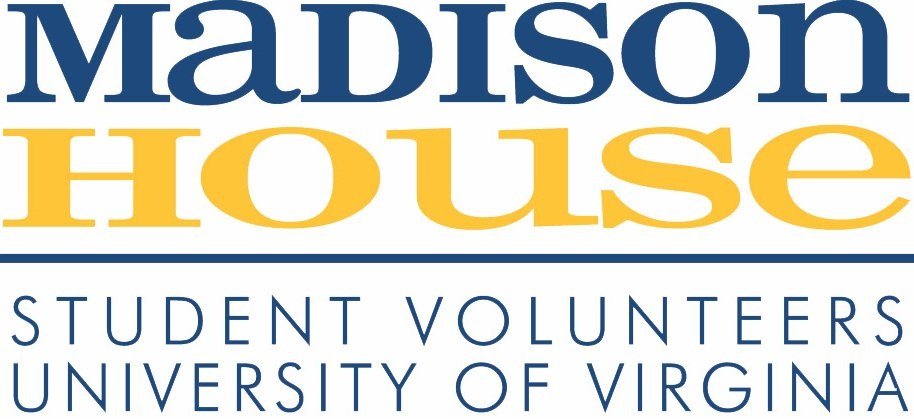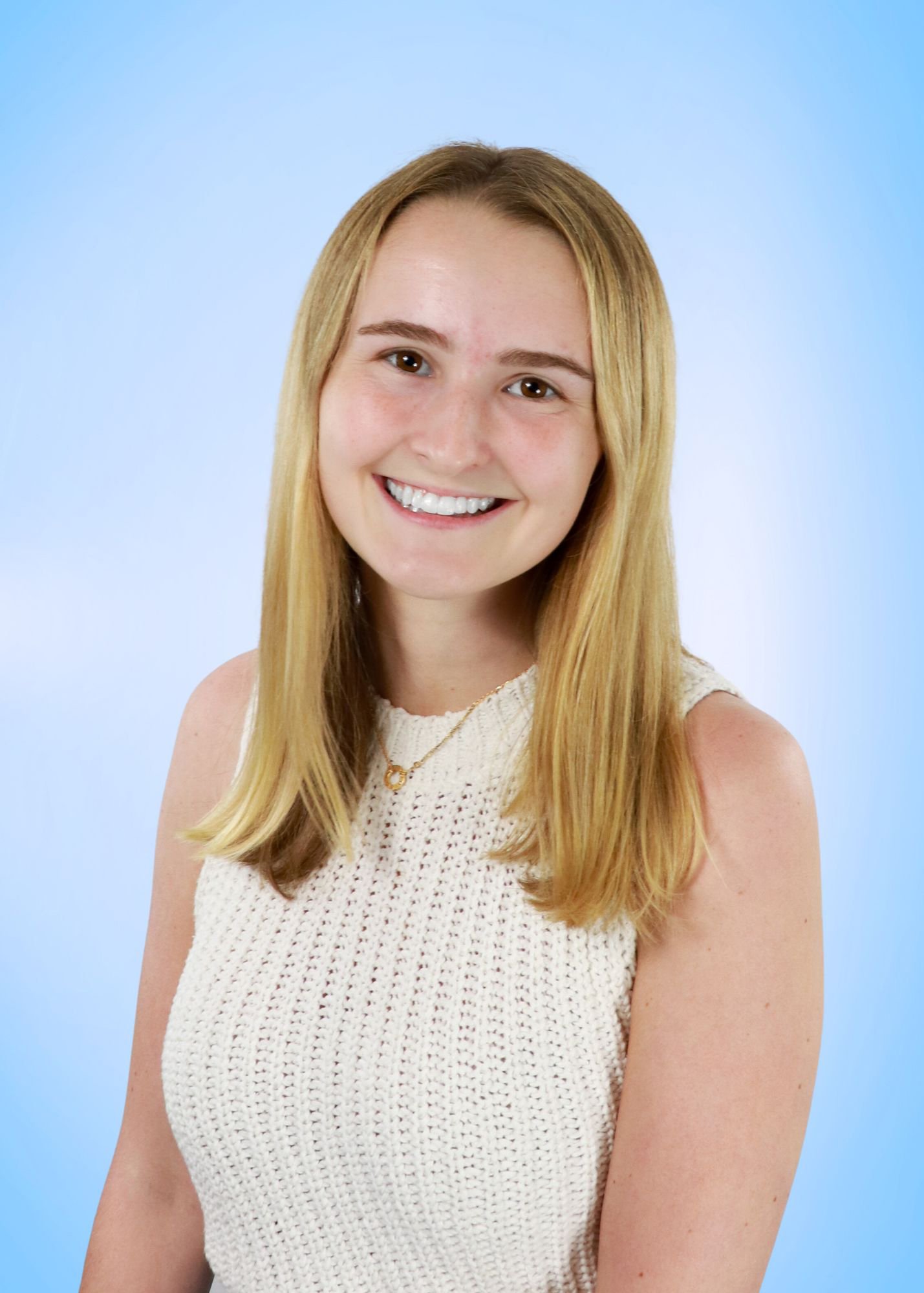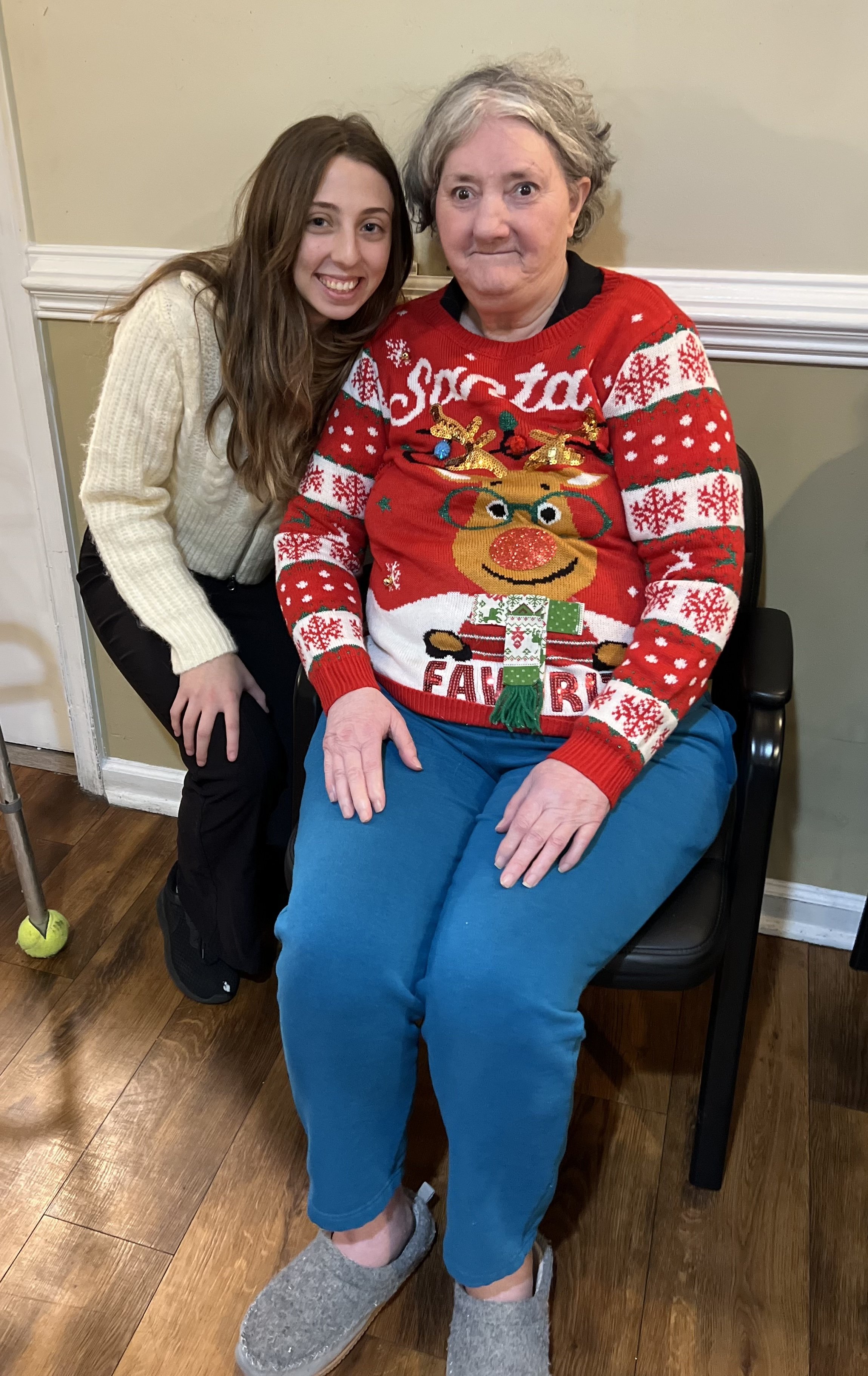Emma Troischt, Adopt-a-Grandparent Head Program Director, and her adopted grandma share stories and smiles during Emma’s visits. (Photo by Caroline Longest)
As Head Program Director of the Adopt-a-Grandparent program at Madison House, Emma Troischt has dedicated many hours to getting to know the woman she calls her “adopted grandma.” After discovering that they both had lived in Emma’s hometown in West Virginia, they quickly developed a close relationship. “My favorite part of my week is getting to spend time with her,” says Emma.
“[She] is one of the most genuine and encouraging people I’ve ever met,” continues Emma. “She loves listening to my stories about college, my family, and how my hometown has changed over the years. I always look forward to her stories about being a nurse and attending university before it became co-ed. Although she doesn’t remember me week-to-week due to her Alzheimer’s diagnosis, I will always remember her. Whether during that visit she thinks I’m her daughter, a friend, or simply a stranger, I always find happiness in talking with her. She has profoundly motivated me in my pursuit of a healthcare career.”
Kathryn Ellis serves as Co-chair of the Madison House Board of Directors and is a volunteer in the Adopt-a-Grandparent program.
Volunteer Kathryn Ellis has also found a friend in her adopted grandfather, a retired accountant who served two tours in Vietnam. “Always smiling while sharing stories, he is a kindhearted, selfless man who radiates positivity,” says Kathryn. “During his service in Vietnam, he chose to remain overseas so that the men with young children could return home sooner. His strength of character is something I greatly admire and aspire to. He views life as a gift and wholeheartedly embodies gratitude each day.” In spending time with her adopted grandfather, Kathryn says she has found not only a rewarding friendship but also a living inspiration.
The Adopt-a-Grandparent program connects Madison House volunteers with eleven different organizations in Charlottesville that provide services and resources for older adults, including Heritage Inn, JABA, The Lodge at Old Trail, Our Lady of Peace, The Blake, Mary Williams Community Center, The Colonnades, Charlottesville Health & Rehabilitation Center, Cedars Healthcare Center, The Center, and Commonwealth Senior Living. The sites include nursing homes, rehabilitation facilities, elderly communities, memory-care units, and recreational centers.
Volunteers are paired with older adults in care facilities and recreational centers in the greater Charlottesville area. (Photo by Caroline Longest)
The program’s main purpose is to provide companionship and fun for residents and participants, who may at times feel isolated or separated from their families. “Many of the nursing home residents do not receive regular visitors. For example, most of my adopted grandma’s family lives far away, making me her only regular visitor,” says Emma.
For Emma, this feeling of isolation hits close to home. “During the pandemic, my maternal grandmother fell severely ill with COVID. After time on a ventilator, a lengthy hospital stay, and a rigorous rehabilitation process, she miraculously made a full recovery. My grandmother spent about a month in a rehabilitation facility following her hospital stay. Due to COVID restrictions, my family was not permitted to visit her. When my grandmother returned to living in her farmhouse, she recalled how lonely she felt in the rehabilitation facility. I wanted to find a way to help other people in similar situations as my grandmother. It seemed like fate that I was introduced to the Adopt-a-Grandparent program.”
Kathryn is in her fourth year of volunteering with Adopt-a-Grandparent and spends her volunteer hours with Jefferson Area Board for Aging (JABA). Unlike other locations, the program does not assign volunteers and clients one-on-one. “This has allowed me to form connections with multiple members from various backgrounds, somewhat integrating myself into the community there,” adds Kathryn. And, though Kathryn was introduced to JABA virtually, the sense of community never faltered. “My group instructed chair yoga over Microsoft Teams! While we weren't able to bond with the members of JABA face-to-face during that year, our chair yoga activity was quite popular and we began to see lots of familiar faces on the screen,” she reflects.
Volunteers assist in decorating Heritage Inn for the holidays. (Photo by Caroline Longest)
Kathryn’s favorite memory from her time volunteering was this past Halloween, and it speaks to the strong camaraderie among the participants. “When my volunteer group walked into the center, we were greeted with music, decorations, and costumes. Nearly every member had dressed up for the occasion, and it was heartwarming to see everyone engaged and excited. There was also a costume contest, throughout which each member was incredibly supportive of one another. That day exemplified the sense of community present at JABA, and there were smiles all around!”
“Besides the time spent one-to-one with my adopted grandma, my favorite memories are mostly from the holidays I’ve spent volunteering with Adopt-a-Grandparent,” adds Emma.
This past Christmas, volunteers at Heritage Inn helped the residents decorate, setting up Christmas trees and putting on ornaments. “My adopted grandma handed me ornaments as we discussed our favorite holiday traditions. It was a very meaningful experience. I am so thankful that I was able to celebrate the holidays with her,” smiles Emma.
Volunteers and senior citizens enjoy the personal connections that the program fosters, as well as structured activities. Volunteers participate in related events at their respective program sites and even on Grounds at UVA. For example, this past February volunteers set up a table in Newcomb Dining Hall so that other UVA students could make Valentine’s Day cards that were later distributed to seniors at Heritage Inn. Emma reflects, “They were thrilled to receive the cards, and it brought me great joy to see them so happy.”
Volunteers participate in one-to-one visits with their adopted grandparents, as well as special group events throughout the year. (Photo by Caroline Longest)
The Adopt-a-Grandparent program just recently finalized their partnership with a new site, Commonwealth Senior Living, so additional volunteers are needed next year. UVA Students interested in volunteering should complete an interest form for the upcoming academic year.
“The time commitment for volunteering with the Adopt-a-Grandparent Program is a one-hour weekly site visit and transportation time to your assigned site. However, many volunteers enjoy visiting their sites more than once a week,” comments Emma. The sites are on average a 15-minute commute from the University of Virginia grounds.
While volunteers are not permitted to provide any medical care when volunteering, the majority of volunteering takes place in a clinical setting. Understandably, many of the UVA volunteers are on a pre-med or health-related track. “As a volunteer, I’ve had the opportunity to observe the administration of outpatient care and hear about personal patient experiences. In my experience as a volunteer at Heritage Inn, an assisted living and memory care facility, I’ve had first-hand exposure to the care of patients with chronic memory diseases, including Alzheimer’s and dementia. This program is an excellent opportunity for students interested in the healthcare field,” notes Emma.
Volunteer Alison Song, a biology major, agrees, saying, “As part of the Adopt-a-Grandparent program, volunteering in assisted living and memory care settings has given me insight into the administration of specialized care in ways that prioritize not only the residents’ physical health, but also their emotional and mental health. I have appreciated learning about the many moving parts of long-term care outside of a traditional hospital setting by observing how clinical staff, families, activity coordinators, and volunteers cooperate to create an individualized, supportive care experience for each resident.” She adds, “Most of all, this experience has shown me that whether in a volunteering or clinical role, approaching every interaction with patience and empathy is key to combating residents' feelings of loneliness or isolation that may arise with age and cognitive decline.”
Emma summarizes, “With graduation rapidly approaching, I believe that one of the most difficult parts about leaving Charlottesville will be saying good-bye to this program and my adopted grandma. I am forever thankful to have had the privilege to be part of this program and the Madison House organization. I have met so many incredible people through this program and made long-lasting friendships. It has inspired me immensely while pursuing a career in medicine and will continue to do so as I embark on the next chapter of my life.”
By Cecilia Murphy






